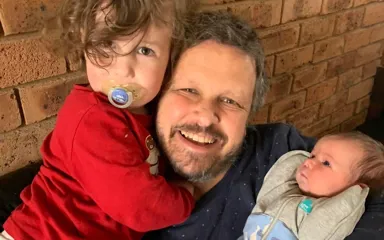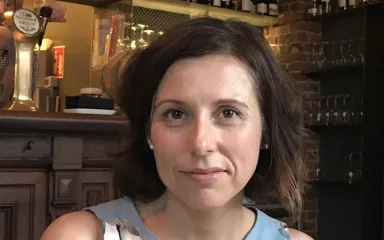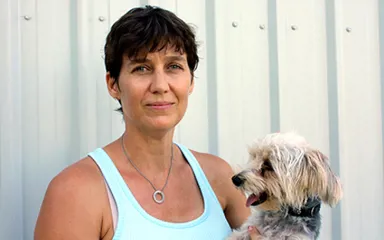Kellie Curtain [00:00:01] Hi there. I'm Kellie Curtain. Since we recorded our breast reconstruction episode of Upfront About Breast Cancer, there's been an important piece of information come to light that we think it's important to share with you. The breast implant manufacturer Allergan has issued a recall of its textured breast implants due to the risk that they could cause a rare kind of cancer in women who have used them in augmentations or reconstructions. The Therapeutic Goods Administration is now investigating the possibility of a ban on these kind of implants. I'm here with breast surgeon Melanie Walker. Melanie, thanks for making the time for us today. What's the background behind this recall?
Melanie Walker [00:00:43] Well the background behind the recall is the associated risk between implants and a very rare form of cancer - a type of lymphoma called Breast Implant Associated Anaplastic Large Cell Lymphoma, or BIA-ALCL for short. And this was a condition that was first reported in 2011 that we became aware of it. The Therapeutic Goods Administration have been monitoring the number of cases and recently it reached a threshold for them to consider a ban associated with a particular type of implant. And what we talk about when we talk about textured implants is ... We're talking about the surface of the implant. And whilst we're talking about - obviously it's significant cancer - it's a very rare occurrence. But the TGA felt that they needed to consider a ban and they made an announcement in early July that they were considering banning the Allergan or macro textured implants. So this risk is about one in 2000 associated with it, with this type of implant. And then after the TGA announced they were considering a ban the company on the 24th of July announced that they were withdrawing the implant from the worldwide market. And that was after the Food and Drug Administration in the US had announced that they were about to announce a ban. So the company voluntarily withdrew the implants.
Kellie Curtain [00:02:18] Okay. So it is rare, around 1 in 2000. For those that have had the implants, how would this present if it was to be of concern?
Melanie Walker [00:02:34] So what it's associated with is a sudden change in the shape, size of the implant. It most commonly presents with an accumulation of fluid around the implant. It's usually seen, I think the average is about eight years after insertion so it's not something that happens straight away. The implants do have to be in for some time. So what women need to be aware of is, as I said, any change in particularly in the size and shape of the implant. More rarely it can present as a lump within the breast or around the implant or a lump in the armpit.
Kellie Curtain [00:03:10] Could something else cause the same symptoms?
Melanie Walker [00:03:13] Yes. I mean the most common cause of fluid around the implant or what we call "seroma" is not this condition. So even if you do develop these changes it's more likely than not that's going to be due to nothing serious.
Kellie Curtain [00:03:26] OK. So I guess the key thing here is don't panic.
Melanie Walker [00:03:29] Exactly.
Kellie Curtain [00:03:30] Get it checked out by... Who is the first point of call?
Melanie Walker [00:03:35] Well the first port of call should be the surgeon that put your implant in. In some cases that will be your breast cancer surgeon, in some cases that may be a plastic surgeon. You may not be still in contact with your plastic surgeon but you certainly would still be in contact and under follow-up of your breast surgeon and there's certainly someone that you could see about this if you're worried at all about your implant.
Kellie Curtain [00:03:57] And would this type of implant be registered as part of your record? How do you know if in fact you did have that implant?
Melanie Walker [00:04:04] Usually most women will be given a little card at the time of the insertion of the implant when they're discharged from hospital that should have, that will have the maker, the brand, the name of the device, and the size of the device. Obviously if you've just had your implant put in recently that's probably close to hand but if you had your implant put in ten years ago then that may well have been lost. So the next point of contact would be the surgeon that put the implant in. So they will have a record on the ... of what has been inserted. And say if your surgeon is no longer in practice then contacting the hospital where it was inserted there will be a record on your operative note of which device you have in.
Kellie Curtain [00:04:47] So we know it's 1 in around 2000. How many women are we talking that could be at risk here?
Melanie Walker [00:04:53] So unfortunately we don't actually know exactly how many women in Australia have breast implants put in. We have an idea. I think certainly from the breast cancer population we probably have better records kept of those patients. The vast majority of implants that are put in in the country are actually cosmetic implants so the reconstructive population is a smaller proportion of the number of implants. There is the Australian Breast Device Registry or ABDR and so most breast cancer patients I think would be captured, I certainly would hope so, in that registry. That initially was an opt in registry, over the last five or so years it's been an opt out registry. So women who've had implants have probably been contacted by the Device Registry in the context that we are following up implants in general. So I mean someone may have opted out of being in that registry. But what we know. So between 2012 and 2018 in terms of reconstructive patients there are about 12,000 devices - so implants in the reconstructive setting. And last year there were about around 4,000 devices put in so that in some... That's not patients that's implants.
Kellie Curtain [00:06:16] OK. So someone who's had reconstructive surgery ... are they any more at risk because they've already had cancer?
Melanie Walker [00:06:24] No. The actual breakdown in terms of who. Who. If it's been an augmented or reconstructed patient. I don't think that you are any more likely and you may be even less likely if you've had breast cancer because there are other there were other factors involved it's not probably just related to the implant. There is some suggestion that it may be related to the way that the implants are put in and potential contamination at the time of insertion with bacteria. Obviously it's due... It must be related to the type of implant because we see differing rates with... Due to the surface of the implant. It's something to do with how long they've been in and there's probably some patient factors, genetic disposition to the condition as well. I mean breast cancer patients, they've had other treatment. A lot of them will have had chemotherapy they, may have had radiation. They're also being followed up and so certainly any changes are going to come to light sooner than potentially in someone who's had a augmentation who often isn't being followed up.
Kellie Curtain [00:07:30] Whilst we say don't panic as soon as you hear that there's been a recall it's very hard to to quell the nerves if you like. What should women do? Should they have them out?
Melanie Walker [00:07:42] We're certainly not recommending that. So I think the first thing that women need to do is find out what implants they have. So there will be a number of women who have smooth implants in and there haven't been any cases reported with smooth implants in Australia. So yes the knowledge, knowing what you have. This cancer is so rare and that is why it's not recommended that routinely you have the recall implant removed. What you have to be is aware of any change and act promptly on that. But obviously you know women are going to be anxious and I think if you have any concerns then you should arrange a consultation with your surgeon and have a discussion about it. And for some women that very rare risk may be something that they're not willing to accept and then they need to talk about options and taking it out of taking the implant out. But it's not something that we're routinely recommending.
Kellie Curtain [00:08:39] The TGA has said it's looking into banning all textured breast implants. Why is that?
Melanie Walker [00:08:45] Because it's ... As I said, I think the the feeling from looking at the research is that there must be some relation to the texture of the lining of the implant because there are different rates for different sorts of textures. As I said there are smooth implants and then there are what are called macro textured which are the Allergan implants which have been recalled and micro textured implants. Now the risk associated with the micro textured implants, and these would include tissue expanders which are obviously part of, often part of breast reconstruction. That risk is in the order of one in 14,000 so incredibly uncommon. But because it is there is an associated risk. The TGA which is responsible for safety does have to have a look at that and there they have an expert panel advisory panel which when they announced their... I think they are proposing to suspend them temporarily. They opened... The panel's been open to submissions from interested parties and they're going to relook at all that data but a decision regarding those implants is yet to be done.
Kellie Curtain [00:09:54] Because in the meantime what about those who are about to or looking at having a reconstruction. Are there any suggestions you have for them in relation to the implants that they might be looking at having?
Melanie Walker [00:10:11] Well I mean any discussion about any part of treatment involves a discussion about risk and benefit and women with breast cancer are used to having to make these decisions. They have to make decisions about chemotherapy because there is a risk of a very rare second cancer from chemotherapy as there is a risk of a very rare second cancer from radiotherapy which is used in the treatment of breast cancer and those risks are in fact higher than the risk of this ALCL. There are always options with reconstruction but for some women implant-based reconstruction will be their only option. Not all women have the option of a tissue based reconstruction. And so I think it really is a discussion between the woman and her treating team and an understanding of those risks and working out for you as an individual if you feel that that risk is something that's acceptable or not acceptable. What we know about reconstruction is that it doesn't have any difference in terms of your outcome from your cancer treatment. You don't do any better you don't do any worse. But there's certainly a lot of evidence to support that the psychological benefits of breast reconstruction and the improvement in quality of life. So I think it's an individual decision.
Kellie Curtain [00:11:31] Thank you to Melanie Walker with any queries you might have. Please contact your health professional and there's lots more information on BCNA website BCNA.org.au






















Listen on